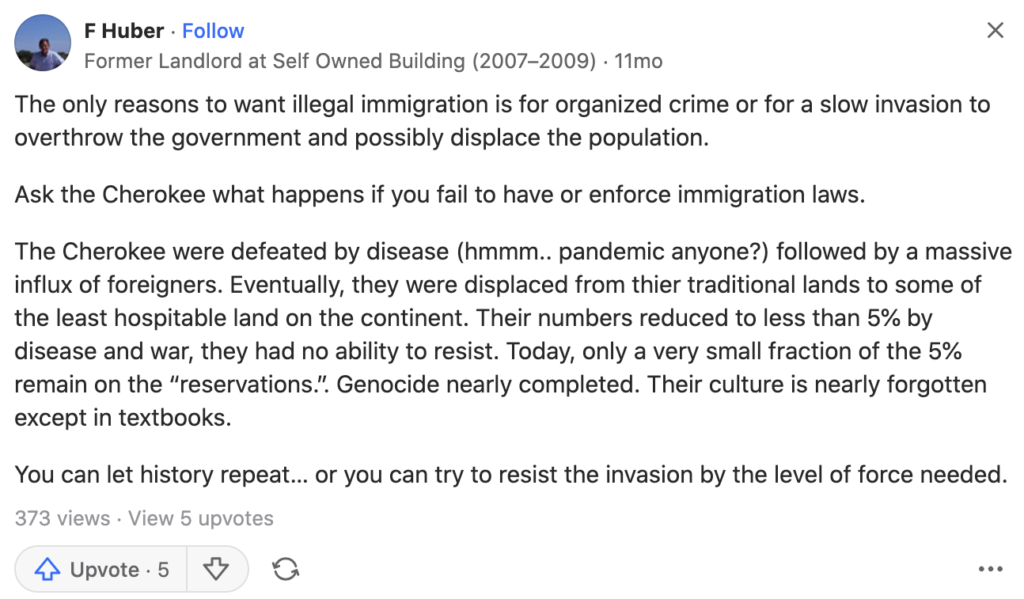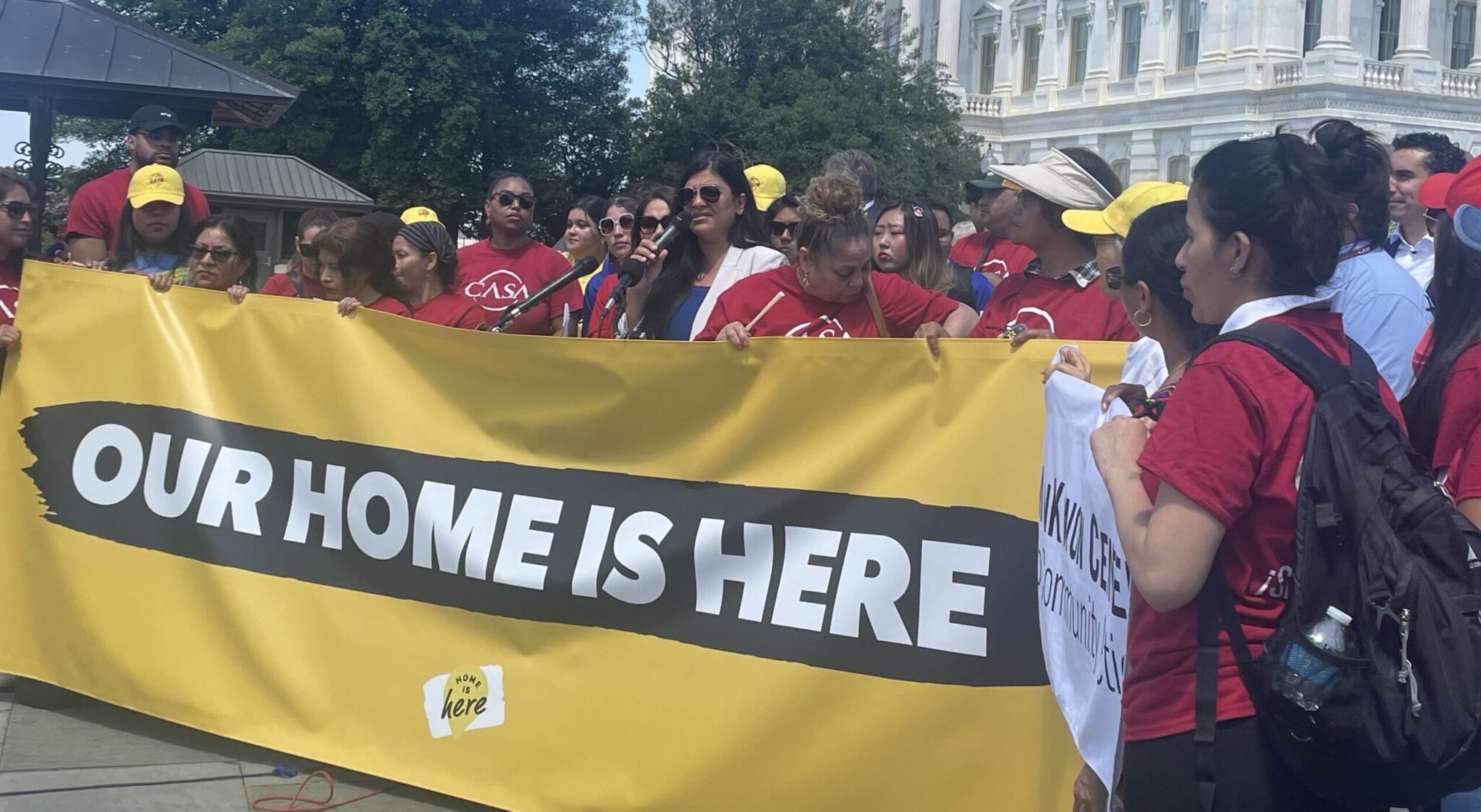⭐️ Highlights
- Openly calling immigrants “invaders” is a common fearmongering and dehumanization strategy to rally political support.
- The conflation of immigration with invasion might be rooted in the fact that throughout history, a lot of large-scale unwanted foreign arrivals have actually been official invasions. Migration has entirely different purposes and effects, but a lot of people might not be aware of this.
- Some people may find immigration unofficially invasive due unwanted cultural infusion and false narratives of economic competition or excessive crime.
Have you ever heard how awkward Spanish sounds spoken in an American accent? That alone should be enough for Venezuela to never invade the US. Not even as retaliation for this country backing some of their gruesome dictators for the sake of grabbing more of their oil.
Fortunately, it doesn’t seem like any foreign country is going to invade anytime soon or wants to. However, the more hyperbolic, alarmist end of dehumanizing anti-immigration rhetoric by everyday people and politicians seems to embody a sense of “we need to stop the barbaric invaders from taking over and destroying our homeland”, seriously likening immigration to national invasion and forceful national conquest. It’s a common fearmongering strategy alongside painting immigrants as inherently dangerous.
This is especially common with unauthorized immigration, as you can see in this official White House statement “Protecting the American People Against Invasion”. I guess to them, migrants evading official vetting evokes a sense of unwanted intrusion. Much of this rhetoric understandably highlights dangerous criminal organizations such as Tren de Aragua, but even their presence in the US isn’t anywhere near the degree of threat commonly believed.
While today’s “invasion” narrative generally claims to single out undocumented criminals and organized crime, we all know that lawful US citizens have been detained and individuals with no criminal record have been deported. This narrative has also been applied to migrants of all legal statuses throughout history, including whites and East Asians.
Not everyone who screams “immigrants are invading” mean it literally — some might just be using those words to purposely exaggerate the perceived unwanted cultural, safety, and economic threat immigrants make them feel. A third of Americans believe that the country will lose its culture and identity, possibly fearing that marauding immigrants will not only invade but also conquer and colonize. This can go as far as endorsing white nationalism and believing that immigrants will actually destroy and replace Western civilization, as depicted in dystopian novels like The Camp of the Saints.
Some proponents of immigration speculate that a lot of white folks are simply afraid immigrants will do to them what their European ancestors did to well, most of the world. Projection much?
[⚠️ Note: all anti-immigrant content will be outlined in red!]
Large-scale unwanted entry into one’s kingdom is indeed historically associated with invasion, conquest, and colonialism across the globe. The intentions and impact of most migrants are worlds apart from that, but this hostile metaphor is a persistent theme throughout our history anyway. It’s the force behind policies such as the Chinese Exclusion Act of 1882, which was inspired by the hostility described in the book The Chinese Invasion. The Nazis also used similar “you’re being attacked but we can defend you” rhetoric to justify actually invading Poland.
This logically fallacious false equivalence and appeal to fear is hardly unique to Americans — it’s globally pretty common in Canada and Europe as well. Such rhetoric intentionally or unintentionally amplifies fear and physiological and emotional hostility already incited by obnoxiously loud anecdotes of “migrant crime”. Since no one actually wants their space invaded, it’s an effective tool for othering and dehumanizing immigrants by impeding empathy and thus constructing an emotionally distant, adversarial dynamic between Americans and immigrants.
Dehumanizing entire populations to achieve political objectives has been a consistent theme throughout history, justifying mass atrocities such as the Holocaust and colonialism. Today, the frequent usage of the divisive term “alien” further emphasizes group distinction and incurs more prejudice in contrast with the more emotionally neutral term “undocumented workers”. Aliens generally aren’t portrayed as the nicest species in the media, so it makes sense using their namesake is pretty effective.
How guilty would you feel obliterating a scurry of roaches with a flamethrower? That’s why a lot of people don’t feel terrible watching videos like the White House’s “Deportation ASMR”. Why treat subhuman vermin or aliens with human dignity?
➡️ For more on the dehumanization of immigrants as a political tool, see The Dehumanization of Immigrants and Refugees from Purdue University.
Anti-immigrant rhetoric already takes a psychological toll on the targeted communities. The toll can extend beyond everyday prejudice: psychologists and political scientists have found that violent rhetoric is typically associated with support for political violence and well, actual political violence. Some striking examples of such violence explicitly inspired by invasion rhetoric includes mass murder, particularly the El Paso shooting in Texas (the state whose governor declared a migrant “invasion” in January 2024) and the Christchurch shooting in New Zealand.
Us East Asian-Americans were also targeted with vaguely similar narratives and violence during the 2020 pandemic due to its alleged viral origins in China, horror stories of Chinese spies stealing US intellectual property, and China’s economic rise to power. You might remember that this tripled the amount of anti-Asian hate crimes, which sank in 2022 after those narratives calmed a bit. Now that thousands of Chinese migrants are entering the US through our southern border, this doesn’t bode well for anyone assumed to be Chinese.
It’s worth noting that anti-immigrant sentiments globally tend to be higher in rural and suburban areas where residents are less likely to interact with immigrants, making it harder to recognize their reality rather than their invasive portrayal as “the most violent people on earth” as stated by the president. Part of that reality is that undocumented immigrants aren’t consuming an an excessive amount of American welfare or drive down wages as invasion narratives commonly believe.
A lot of people have have fewer opportunities to counter prevailing narratives or genuinely don’t want to.
Most logical explanations of the urban-rural divide attribute it to a lack of social interaction and formal education, which might be why anti-immigrant sentiments are also stronger in rural parts of other countries such as Canada and Norway. I witnessed this firsthand when visiting both.
An additional psychological explanation might be the disempowerment rural residents feel due to their own economic depression. When you’re horribly stressed out over feeding your family and everyone you meet is as white as mayonnaise, it’s understandably less likely you’ll feel your own racial privilege compared to people of color or your nation’s global dominance. You’re more likely to see your own and your town’s deprivation than that while lacking the bandwidth to confront common narratives.
When you feel that disempowered and vulnerable, it makes sense immigration might heighten perceptions of perceived unwanted economic and social competition, which typically takes the form of the infamous “they’re taking our jobs”. Opposing immigration might be a subconscious form of self-defense, which means “invasion” rhetoric inadvertently hones in on this instinct. Voting against immigration might make you feel like a hero bravely defending your homeland.
As you can see from the data above, not all rural residents oppose immigration and approximately 30% of urbanites do. You’re probably aware of how often urbanites link immigration to crime and economic issues such as unemployment, which are totally valid issues in several cities. Proponents of immigration usually view this as scapegoating, citing the fact that diversity typically makes businesses and cities more prosperous and innovative.
With legally authorized immigrants, “invasion” rationale sometimes echoes the debunked Great Replacement theory, which believes that Democrats legally puppeteer the mass migration of Jews and people of color to undermine the cultural and physical dominance of white Americans. Most of us know our immigrant parents aren’t invading anything beyond a cookie tin with sewing supplies. Or our personal space.
While anyone assumed to be a migrant is susceptible to being detained or at least some kind of unwarranted discrimination, the undocumented and anyone assumed to be such will bear most of the brunt. This rhetoric has already galvanized excessive spending on deportations and the creation of new policies making it easier to deport the undocumented for committing minor crimes, such as the Violence Against Women By Illegal Aliens Act.
Even white Europeans, including Germans, have been detained. While ICE refuses to disclose why, I wouldn’t be surprised if it was because they’ve been pointing out that the US might be heading down the same nasty path they did in the 1940s.
Unsurprisingly, legal experts warn the “invasion” rationale could be used to further bend immigration law to evade the typical due process legally required for deportation. It’s like you kicking out your roommate because his annoying off-key K-pop covers makes him sound like the assholes who broke your heart in 2015, but you’ve got zero evidence he’s broken anyone’s heart.
Since the Constitution does justify engaging the military and starting wars to combat actual invasions involving a foreign military force, compelling enough arguments that today’s immigration is indeed akin to invasion could be disastrous.
Again, all it takes to be detained is the wrong ICE officer assuming you aren’t from this country or pose a national security threat.
One striking example of how current officials are already attempting to legally combat immigrant “invaders” is the invocation the Alien Enemies Act of 1798 by President Trump, which was created to rid the country of foreign threats as quickly as possible. This act has only been used during actual wars.
Although the intent to target actual members of Tren de Aragua sounds like something most of us can support, the Alien Enemies Act has been questionably allowing the deportation of hundreds of Venezuelans without due process or any kind of investigation whether they were actually a part of Tren de Aragua or not. Immigration lawyers have noted that the detainees seem to be profiled by their tattoos, most of which actually intend to honor soccer teams and family members. How threatening.
📣 You can protest the deportations of Venezuelans online at 5 Calls.
It’s worth noting that the Alien Enemies Act hasn’t been modified since slavery was legal and permits targeting totally legal migrants. It permits evading the necessity of proof whether the migrant is a national security threat or not, which means you can be detained just because someone thought your angsty Powerpuff Girls fanfiction from 2009 contained subliminal messages about you channeling your inner Mojo Jojo to start a civil war.
Remember when the US was fighting Japan during World War II and decided to use the Alien Enemies Act to incarcerate totally legal Japanese-American civilians en masse (including 80,000 born in the US)? All that was considered constitutional at the time, although the government later apologized and sent out reparations.
On February 19, 2025, the Japanese American Citizens League posted an official statement reminding us of the impact of this act, warning of the “perversion of civil rights laws”. That’s pretty ominous coming from them.
The narrative of migrants as an unwanted invading horde sets the foundation for another particular, common fearmongering strategy: the invaders defiling your women. Evoking this narrative is probably why the white female victims of migrant perpetrators are often spotlighted. While these perpetrators indeed deserved punishment, the disproportionate weaponization of their victims (such as the naming of the Laken Riley Act) follows historical patterns of propaganda of white guys casting all guys of color as inherent threats to white womanhood, bent on defiling their virtue.
Since actual invaders typically do murder “your own kind”, it makes sense that spotlighting these particular tragedies effectively paints immigrants as an invading horde by reinforcing existing beliefs, thanks to the confirmation bias. While some immigrants do commit violent crimes against citizens, these instances are hardly representative of their collective presence: undocumented immigrants actually have lower crime rates than US citizens.
➡️ For more on the connection between the weaponization of white women as anti-immigrant propaganda, see Protecting Our (White) Daughters: U.S. Immigration and Benevolent Sexism from Cambridge University.
Where might “invasion” rhetoric come from?
Perhaps humanity might be more used to actual invasions than large-scale migration. As previously stated, large-scale unwanted entry into one’s kingdom is indeed historically associated with invasion, conquest, war, and colonialism. Throughout most of human existence, people have always been politically allied with their own tribe or nation, knowing little else beyond. International or inter-tribal interactions often took place over battling each other for resources, such as caveman tribes battling it out over who gets the next woolly mammoth kill.
As previously stated, equating migration, even unauthorized migration, with invasion or colonialism falls under the false equivalence logical fallacy. While both national conquest and migration technically share the factor of “lots of unwanted people from another country coming over, influencing our way of life, rising to power, and using our resources”, their purposes and power dynamics are worlds apart.
Examples like this fail to recognize that today’s migrants don’t have the intent to stage hostile takeovers like the white settlers often did to the Native Americans. The settlers were compelled by “Manifest Destiny” to overthrow human “obstacles” to divinely entitled land, which led to forced displacement and violent massacres obliterating several Native American tribes. Today’s migrants of all legal statuses just want to live normal, law-abiding lives in a safer, more economically prosperous environment, “taking” American land by paying rent and working like everyone else.
Multicultural societies have existed throughout history, but the degree of immigration and multiculturalism that we’re experiencing now seems to be a relatively novel experience for humanity. The most well-known evidence of voluntary and noninvasive large scale non-white migration to predominantly white societies started only in 1849 with Chinese migrants in California who were also subject to social villainization, violence, and exclusionary laws. Hispanic migrants didn’t arrive until 1910.
As someone who’s lived for years in some of the most immigrant-heavy cities in the US, Canada, and Europe, I know immigrants aren’t forcing citizens to assimilate to their culture like white Americans and Canadians did to indigenous children with boarding schools. No, the new H-Mart five blocks away from your house isn’t a sign of colonialism. It just means your neighbors want kimbap. Try it!
We aren’t being forced to lion dance or watch telenovelas to survive. Don’t worry about losing your precious Applebee’s to a taco truck (although some of us wouldn’t mind). The already strong presence of immigrants isn’t even enough to get some white folks to not wear shoes inside the house.
Perhaps some people just aren’t aware of how much of this country has been built on noninvasive immigration since its “founding” in the 1600s, much of which wasn’t legally authorized, including millions of undocumented white Europeans. Yes, the original settling of white Europeans was pretty invasive, violent and displacing to the Native Americans, but no other immigrant group in American history has purposely organized anything to that scale.
Possible rebuttals: It’s true that some “model minorities”, such as Jewish and Asian-Americans, are statistically overrepresented in many positions of power and influence. I’ve worked in both entertainment and tech long enough to experience the impact of that. However, one can argue that soft power is key to cultural dominance, and the soft power of both groups has been horribly undermined by white Christian supremacy’s demonization. So we won’t be beating white supremacy anytime soon. But if we do, what’s wrong with that?
Sometimes, it’s just racism
If you believe certain immigrants are inherently barbaric and violent enough, it’s a lot easier to see them as invaders. Because that’s what barbarians do.
In 2014, I saw through fearful white eyes more than ever when I studied abroad in the much more homogenous country of the Netherlands, a small 80% white European nation facing its own “migrant crisis” mainly from Muslim refugees. I encountered a much more intense and frequent scale of anti-immigrant sentiment as I was used to back in California. Don’t get me started on how bad the hatred for the Romani was in France.
Because most migrants there came from countries I was unfamiliar with at the time, I tried to keep an open mind, pondering “perhaps immigrants here are different than the ones back home. Maybe they really are a lot worse.” I listened to plenty of “they’re bringing Sharia backwardsness, crime, terrorism, and will never assimilate to our developed Dutch society” talk by far-right Dutch politicians such as Geert Wilders and Ayaan Hirsi Ali while munching on stroopwafels or black licorice. I don’t recommend that second one.
Fortunately, my classmates at Utrecht University were able to counter these narratives with their own progressive opinions before we headed off to the local “American-themed” party where they could cosplay as American college students playing beer pong. Yes, those exist.
🤔 💬 Got a theory of your own to add?
Are there any grains of truth to today’s “invasion” rhetoric?
Legally and literally speaking, no. There aren’t any countries currently invoking their militaries against the US to seize control or resources, which is what typically happens during an actual invasion. The presence of decentralized criminal organizations like Tren de Aragua aren’t powerful enough to constitute a de facto militia.
Emotionally and metaphorically speaking, yes. If you hate immigrants enough, experiencing their cultural, economic, or political influence anywhere, no matter how lawful, can feel like an unwanted intrusion and thus an unofficial invasion onto your desired way of life. Immigrants have indeed influenced the cultural fabric of the US in many different ways beyond being overrepresented in certain industries such as tech where I am, evolving our overall pop culture, cuisine, and politics. People of color are even evolving evangelical Christianity beyond just skin color, making it more progressive.
Perhaps some individuals see cultural evolutions like “people of color finally not dying first in horror flicks” as a slippery slope into erasure or marginalization — or on the more extreme end, conquest or replacement.
Some believers of an invasion single out unauthorized migration due to it possibly evoking a sense of losing control of the country’s borders, law enforcement, and national sovereignty. While unauthorized migration and invasion technically share characteristics of initial unwanted, unvetted, illegal entry, we know that its impact isn’t anywhere near as malicious — contrary to false fearmongering narratives of “migrant crime” and economic drain.
A perceived lack of assimilation, high crime rates, political influence, extra competition for resources, and visible cultural practices can be perceived as officially or unofficially invasive
Much support for the invasion narrative seems to fear a loss of whatever they think American cultural identity is, finding anything associated with immigrants harmful or repulsive.
Beyond the typical political fearmongering of terrorism, cartels, espionage, and other forms of migrant crime, you might have noticed that civilian “invasion” rhetoric often adds a layer of “they refuse to integrate and become American”.
For a lot of people all over the world, showcasing any immigrant cultural heritage at all comes off as intrusive and a refusal to assimilate, viewing the sight of a taco truck on their block is the first sign of the apocalypse. Hearing someone curse egg prices at Whole Foods in Mandarin sounds like “the fall of Western civilization.”
See where I said immigrants are “evolving” this country above? Opponents of immigration would replace that with “deteriorating” to align with their views.
One poignant reason is that immigrants and their kids are more likely to vote Democrat than white Americans are, which to Republicans is the “wrong kind” of assimilation. There are still plenty of exceptions, such as my immigrant aunt who literally said “I don’t support gay marriage because God made Adam and Eve, not Adam and Steve”. (He technically did make Adam and Steve, if it’s true that God makes everyone “in His own image” as Christians believe.)
Because these voting patterns sometimes actually elect Democratic officials to power, some white Republicans perceive this an unwanted form of ideological conquest even if the officials themselves are as white as paper. We already know that plenty of white folks are threatened by initiatives such as DEI and perceived teachings of critical race theory, which they perceive as undermining their supremacy discriminatory and marginalizing.
In 2025, the attempt to prevent an ideological conquest has escalated to the detaining of totally legally authorized immigrants like Mahmoud Khalil for siding with the “wrong” political views, such opposing the genocide of Palestinians. Hundreds of student visas have been revoked from international students for participating in protests.
Interestingly, many other opponents of immigration (and even some proponents I’ve met) complain that immigrants often bring harmful and “backwards” cultural practices with them such as colorism and wearing hijabs. I can see why these arguments, which were especially common in the Netherlands and had me almost agreeing with Dutch anti-immigrant sentiments, seem compelling. But no community should be generalized on these stories.
A common argument in both the US and the Netherlands is that too much diversity without assimilation or at least integration causes too much unsustainable, unwanted social friction. I personally experience no shortage of most of the clashes opponents of immigration complain about: language barriers with immigrants who don’t speak English, higher crime rates in certain neighborhoods, and the stench of durian. I don’t perceive any of this as an invasion, but I know others will disagree.
My feelings seem to be a product of my awareness of how immigration of all legal statuses enrich the country and my personal life with culturally diverse friends and family, art, cultural festivals, seasoned food, the innovative and creative success of San Francisco and Los Angeles, and Chinese potato salad. I learned to call out the common “they’re taking our jobs” scapegoating of immigrants, blaming economic insecurity and competition on systemic factors caused by politicians and institutions in power such as corporate greed.
I learned that the aforementioned higher crime rates in some immigrant communities were consequences of poverty rather than cultural deficiencies, poverty exacerbated by intergenerational trauma, colonialism, and systemic conditions such as the school-to-prison pipeline.
I stopped complaining about “unassimilable” immigrants like my annoying aunt when I realized how difficult it actually was for someone to integrate in a new country and learn new languages, especially if their mental health was plagued by war and famine back in the motherland. And if they were faced with the frustrating confusion of phrases like “yeah, no” and making the awkward mistake of literally answering “how are you?”.
My feelings towards integration further evolved from learning about historical policies such as redlining and economic disparities that formed unwanted barriers to assimilation. Today’s immigrants face financial and social hurdles to assimilation such as unresolved trauma, a lack of accessible English lessons, and racial prejudice. To address this, some proponents of immigration advocate for systemic reforms to make it easier for immigrants to integrate and acculturate rather than assimilate, which risks the loss of cultural identity and can have a harmful psychological impact.
The overall perception of immigrants as invaders, even if just metaphorical rather than legally official, has undoubtedly led to too much legal and emotional disaster in just the first few months of 2025. This particularly adversarial form of dehumanization has resulted in horrifying family separations, an erosion of free speech, racism, and Americans being forced out of the country where they grew up just for being brought to the US unauthorized as children. American citizens in vital industries are enduring the economic consequences by losing large percentages of their workforce.
We’re unfortunately at the point where the presidential administration isn’t trying very hard to retrieve this wrongfully imprisoned guy from a frightening prison full of actual gang members. Even though the Supreme Court literally said they should. This doesn’t bode well for citizens either.
When supporting deportations and hating immigrants is portrayed as an act of defending your people from scary invaders, it’s easy to feel that you’re a valiant hero simply fighting the evil villains trying to destroy what you love. Doesn’t that sound so much more noble than “brown people give me The Ick?” Also, durian isn’t that bad when diluted in a smoothie.





